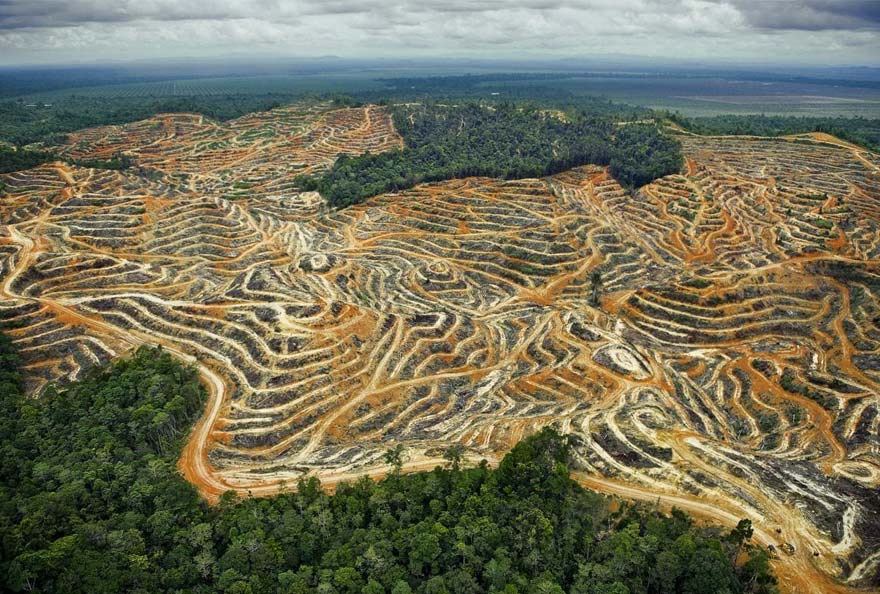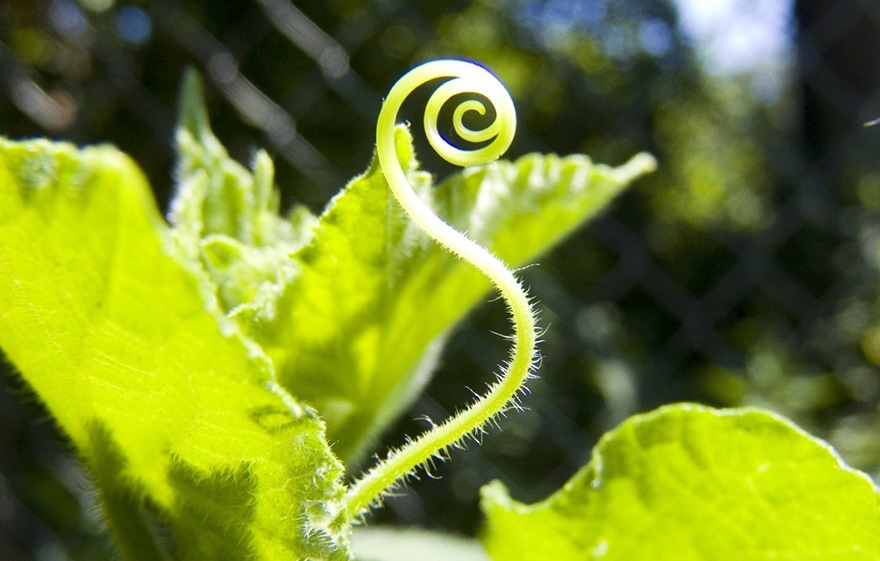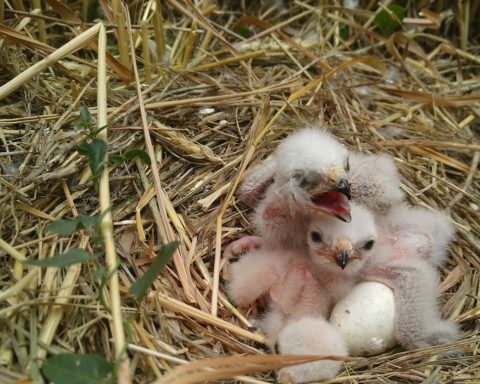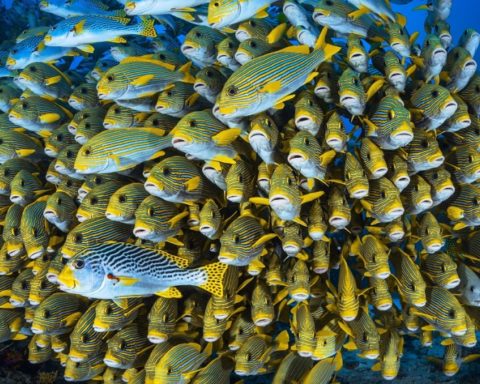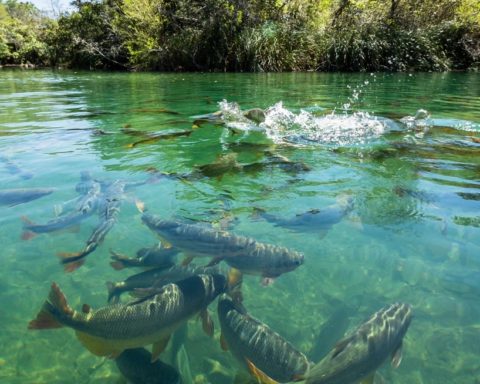
Un nouveau rapport d’avril 2018 de Rainforest Action révèle l’un des cas les plus graves de destruction illégale de forêts tropicales à Bornéo recensés ces dernières années. Ce sont environ 10 000 hectares de tourbière qui ont été détruits illégalement pour faire place à des plantations de palmiers à huile, au mépris des réglementations indonésiennes et malgré l’engagement pris par les entreprises de ne pas détruire davantage de forêts et de tourbières. Ce rapport met en cause deux producteurs d’huile de palme, tous deux contrôlés ou associés au plus grand conglomérat indonésien, le Groupe Salim. Ce vaste réseau d’entreprises comprend notamment Indofood, partenaire incontournable des multinationales PepsiCo et Nestlé.
Le rapport s’intéresse aux activités de destruction de deux producteurs d’huile de palme opérant dans la région de Sintang District, sur l’île de Bornéo, en Indonésie : PT Duta Rendra Mulya (PT DRM), dont le principal actionnaire est Anthoni Salim, et PT Sawit Khatulistiwa Lestari (PT SKL), liée à M. Salim par le biais de partenaires d’affaires.
10 000 hectares de la plus grande tourbière de la région de Sintang à Bornéo, appelée Ketungau, viennent d’être détruits, soit l’équivalent de 10 000 stades de rugby, au profit de la production d’huile de palme. D’après des analyses réalisées par Greenpeace à partir des données officielles, 24 millions d’hectares de forêts ont été détruits en Indonésie entre 1990 et 2015.

Le Groupe Salim a été informé pour la première fois de cette déforestation massive en février 2016, mais n’est pas intervenu malgré les injonctions répétées du gouvernement de mettre un terme à la destruction des tourbières. Au lieu de cela, le rapport montre que l’une des filiales du groupe a fait modifier la carte du moratoire protégeant les tourbières, alors même que les cartes établies par l’Agence de Restauration des Tourbières (BRG) classaient la plupart de la banque foncière en « zones de tourbière à protéger en priorité ».
Anthoni Salim, le quatrième homme le plus fortuné d’Indonésie d’après Forbes, et ses partenaires commerciaux ont déjà été sous les projecteurs par le passé. Salim est bien connu car il possède plusieurs entreprises cotées en bourse (First Pacific, Indofood Agri, Salim Ivomas Pratama, London Sumatera), mais également car il détient des parts, souvent dissimulées par des montages de propriété opaques, dans un ensemble d’entreprises privées propriétaires de plantations qui continuent de détruire la forêt tropicale et les tourbières malgré la réglementation gouvernementale et les politiques d’entreprise interdisant de telles activités, processus de dégradation qui contribue de manière significative au réchauffement de la planète par des émissions massives de carbone.
« Ce rapport est une preuve évidente de pratiques douteuses et d’immobilisme aux plus hauts niveaux des entreprises, alors que les forêts tropicales continuent de disparaître à cause de l’huile de palme produite de façon illégale », affirme Gemma Tillack, en charge de la politique forestière au sein du Rainforest Action Network (RAN). « En attendant, les partenaires commerciaux et financiers du Groupe Salim, comme PepsiCo, sont complices de cette déforestation illégale, car ils continuent de faire des affaires avec Salim sans être inquiétés. PepsiCo, Nestlé et Wilmar doivent faire en sorte que leur partenaire commercial respecte le droit indonésien et les normes de développement soutenable sans déforestation ou bien mettre un terme à leur relation commerciale ».
Les entreprises du Groupe Salim sont entachées par la situation actuelle. De grandes banques, telles que Citibank et Rabobank, sont liées à la déforestation illégale car elles financent le Groupe Salim, malgré des politiques internes interdisant ces pratiques. Toutefois, les banques japonaises et indonésiennes, dont Mizuho et Bank Central Asia, sont les plus exposées car elles ne possèdent aucune politique condamnant de telles activités de destruction.
« Les entreprises du Groupe Salim bénéficient de milliards de dollars de prêts aux entreprises et de financements sous la forme d’obligations et d’actions malgré le lien de M. Salim avec la déforestation illégale actuelle », explique Vemund Olsen de Rainforest Foundation Norway. « Ce rapport démontre l’échec des grandes banques, y compris celles qui ont été alertées à maintes reprises des risques environnementaux, sociaux et de gouvernance du groupe, à faire face à leur responsabilité dans la destruction des tourbières à forte densité de carbone. Les banques doivent être à la hauteur de leurs engagements en matière de dérèglement climatique et arrêter de financer la destruction des tourbières ».
Le rapport montre comment les relations d’affaires de M. Salim ont été remises en question. Son empire est divisé en plusieurs entreprises cotées en bourse et contrôlées par le Groupe Salim, qui a déclaré, sans toutefois s’y tenir, s’engager en faveur de la transparence et de la durabilité, alors que dans l’ombre, les entreprises liées à Salim (ou entreprises de « business à part » comme on les appelle en Indonésie) continuent de détruire les forêts tropicales et de s’attaquer à des tourbières protégées.
Pourtant, le gouvernement national indonésien, à travers une « Instruction présidentielle » de mai 2011 interdit de délivrer des permis de localisation sur les tourbières et les forêts primaires. Près des trois quarts des raffineurs d’huile de palme dans le monde interdisent également le développement des tourbières pour l’expansion des plantations de palmiers à huile. Laissées intactes, les tourbières jouent le rôle d’un « puits de carbone » naturel, qui absorbe et stocke en toute sécurité le carbone hors de l’atmosphère et sous terre.
Les tourbières sont donc particulièrement protégées par le droit indonésien en raison aussi d’un risque élevé d’incendie (les incendies sont presque impossibles à circonscrire) et de leur importance dans la régulation du climat mondial. Ce sont aussi des puits de carbone cruciaux car ils stockent les gaz à effet de serre présents dans l’atmosphère. Chaque hectare de tourbière tropicale qui disparaît au profit d’une plantation émet en moyenne 55 tonnes de CO2 chaque année, ce qui revient à peu près à brûler plus de 22 000 litres d’essence. La destruction de 10 000 hectares de tourbière équivaut à l’émission de 555 000 tonnes de CO2 tous les ans. À titre de comparaison, un véhicule de tourisme moyen émet environ 5 tonnes métriques de CO2 par an.
L’Indonésie s’est engagée à réduire ses émissions de gaz à effet de serre de 29 % d’ici 2030, par rapport à un scénario de statu quo. Cet objectif est ambitieux, en particulier parce que le secteur de l’aménagement du territoire et de l’énergie représentent à eux seuls 80 % des émissions de GES de l’Indonésie. Par exemple, en 2010, l’agriculture et la sylviculture étaient responsables de 59 MtCO2 sur un total de 63 MtCO2 dans le Kalimantan-Ouest.
La destruction des forêts et des tourbières causée par les plantations est propice aux feux de forêts. Bon nombre de ces feux sont d’ailleurs délibérément causés par des entreprises pour défricher les terres et pouvoir y aménager des plantations. En 2015, l’Indonésie a connu une vague de feux de forêts dévastatrice qui avait engendré des fumées toxiques jusque dans plusieurs pays d’Asie du Sud-Est, causant environ 100 000 morts prématurées.
« Dans le monde entier, les consommateurs réclament des produits respectueux des forêts et appellent les banques et les marques à prendre des mesures urgentes » indique Fatah Sadaoui de SumOfUs. « Nous ne pouvons pas rester sans rien faire et regarder les forêts disparaître et le chaos climatique s’aggraver à cause d’investissements bancaires irresponsables ou de l’utilisation par les marques d’une huile de palme non soutenable ».
Des études publiées (1) récemment montrent que la plupart des grandes marques continuent de s’approvisionner en huile de palme auprès des entreprises du Groupe Salim ou y sont exposées par le biais de leurs fournisseurs d’huile de palme. D’autres données récemment publiées indiquent également que les grandes marques s’approvisionnent auprès de moulins à huile de palme qui risquent le plus de s’approvisionner auprès des entreprises nommées dans ce rapport, une fois que les plantations deviennent productives.
En maintenant leurs partenariats d’affaires sans imposer d’exigences claires et fermes en faveur d’un changement, PepsiCo, Nestlé et Wilmar demeurent complices de la déforestation et de la destruction des tourbières de Ketungau causées par PT DRM et PT SKL, et d’autres conséquences socio-environnementales dues aux activités de l’huile de palme contrôlées par le Groupe Salim, ou associées à M. Salim.
Une synthèse des résultats de ce rapport a été envoyée à M. Salim, aux membres de ces équipes de direction et au directeur exécutif de PT Indofood Agri. Aucune réponse à ce jour …
Lire le rapport (en anglais)
Le rapport, qui s’appuie sur des recherches compilées par AidEnvironment, a été commandé par Rainforest Action Network (RAN), Rainforest Foundation Norvège (RFN) et SumOfUs.
(1 )Consultez le récent rapport « Moment of Truth » de Greenpeace pour en savoir plus.
Photo d’entête : Plus de 90 % de la forêt de Bornéo a été détruite. Photographie ©Matthias Klum, National Geographic Creative
Pour aller plus loin :
– Engagements climat et zéro déforestation : Les promesses de » déforestation zéro » des entreprises : tout ce que vous devez savoir (theguardian, septembre 2017) – En anglais
– Analyse d’Oxfam sur la déforestation – En anglais
– Analyse du World Resources Institute – En anglais
S’abonner
Connexion
0 Commentaires
Inline Feedbacks
View all comments

